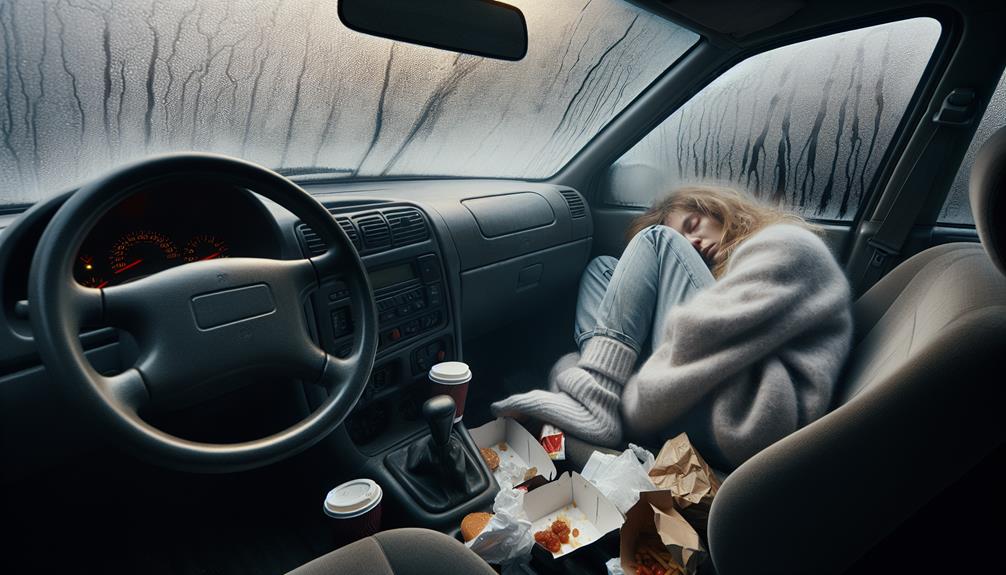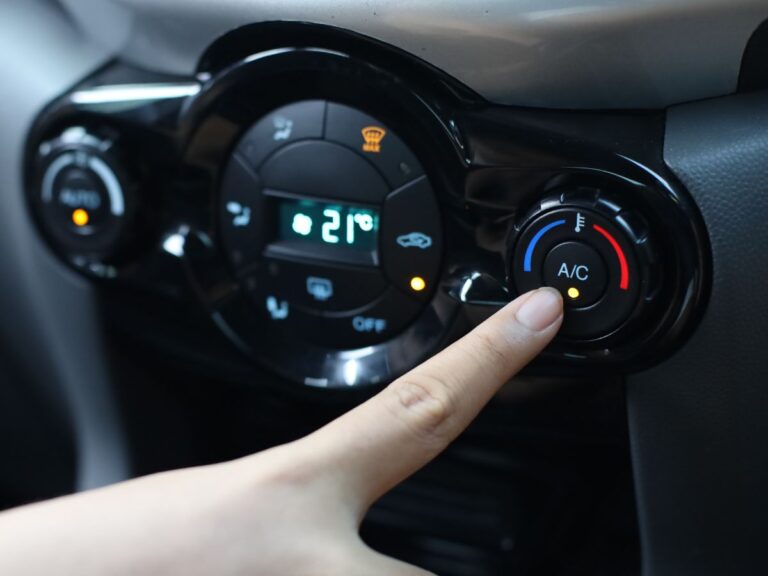The Comprehensive Guide to Understanding the Unhealthy Risks of Sleeping in a Car
Sleeping in a car can lead to muscle stiffness, poor circulation, and back pain. Lack of support and constrained space worsen discomfort. Improper alignment increases pressure on the spine. limited space can cause numbness or tingling. Carbon monoxide poisoning and mold growth are significant risks in poorly ventilated vehicles. Proper ventilation is vital for safety. Sleeping in a car exposes you to poor air quality, which can irritate your respiratory system. Inadequate rest weakens the immune system and can impact cardiovascular health. Addressing these risks is essential for your overall well-being.
Physical Discomforts and Health Issues
Sleeping in a car can lead to physical discomforts and health issues such as muscle stiffness and poor circulation due to the constrained space and lack of proper support for the body. These conditions can exacerbate back pain and contribute to sleep deprivation. When your body is not properly aligned and supported during sleep, it can result in increased pressure on your spine and muscles, leading to discomfort and stiffness upon waking. Additionally, the limited space in a car can restrict movement, causing poor circulation that may result in numbness or tingling sensations in your limbs.
To mitigate these risks, it is essential to try and create a more comfortable sleeping environment within your car. Prioritize finding a position that supports your spine and minimizes pressure points. Utilize cushions or pillows to provide additional support where needed. Regularly stretching before and after sleeping in the car can also help alleviate muscle stiffness and promote better circulation. By being mindful of your sleeping posture and taking steps to enhance comfort, you can reduce the likelihood of experiencing back pain and sleep deprivation when resting in a car.
Safety Hazards and Risks
When sleeping in a car, it’s vital to be aware of the potential safety hazards and risks. Carbon monoxide poisoning is a significant concern, especially in poorly ventilated vehicles. Additionally, inadequate ventilation can also lead to a lack of fresh air circulation, posing health dangers. Ensuring security and safety while sleeping in a car is essential to prevent potential risks.
Carbon Monoxide Poisoning
To mitigate the risk of carbon monoxide poisoning while sleeping in a car, make sure to have proper ventilation at all times. Carbon monoxide is a colorless, odorless gas produced by the incomplete combustion of carbon-based fuels, such as gasoline. When sleeping in a car with poor ventilation, this gas can build up to dangerous levels, leading to carbon monoxide poisoning.
Warning signs of carbon monoxide poisoning include headaches, dizziness, nausea, confusion, and fatigue. If you experience any of these symptoms while sleeping in a car, it is essential to immediately get fresh air and seek medical attention.
Prevention tips to avoid carbon monoxide poisoning include never running the car engine for heating purposes while sleeping, ensuring the exhaust pipe is clear of obstructions, and using carbon monoxide detectors inside the car. Remember, even cracking a window slightly may not be enough to prevent carbon monoxide buildup, so always prioritize proper ventilation for your safety.
Inadequate Ventilation Risks
Proper ventilation is essential to mitigate the safety hazards and risks associated with inadequate airflow while sleeping in a car. Inadequate ventilation can lead to condensation buildup within the vehicle, creating a damp environment that promotes mold growth. This not only poses a risk of structural damage to the car but also increases the likelihood of respiratory issues for the occupants.
Condensation buildup occurs when warm air from breathing and body heat meets the colder surfaces inside the vehicle, such as windows and walls. This excess moisture in the air can result in discomfort for those sleeping in the car and can exacerbate existing respiratory conditions. Additionally, the damp environment created by inadequate ventilation provides an ideal breeding ground for mold spores, which can lead to respiratory problems, allergies, and other health issues.
To prevent these risks, make sure to have proper ventilation by cracking windows slightly to allow for airflow, especially during colder nights when condensation is more likely to form. Regularly airing out the car and using moisture-absorbing products can help combat condensation buildup and reduce the chances of mold growth, ultimately safeguarding your health while sleeping in a car.
Security and Safety
Ensuring your safety while sleeping in a car requires awareness of potential safety hazards and risks that may arise from the surrounding environment. Privacy concerns can be a significant issue when sleeping in a car, especially in urban or crowded areas where individuals may be at risk of being observed or targeted. To mitigate this risk, consider using window covers or finding secluded spots away from prying eyes.
Noise disturbances can also pose a threat to your safety while sleeping in a car. Loud noises from traffic, passersby, or nearby establishments can disrupt your rest and potentially alert others to your presence. It is advisable to seek out quiet locations, use earplugs, or play white noise to minimize disturbances and enhance your sense of security.
Poor Air Quality Concerns
You should be aware that sleeping in a car can expose you to poor air quality, with increased risks of inhaling pollutants and toxins. Proper ventilation is essential to help reduce the concentration of harmful substances inside the vehicle. Failing to address poor air quality concerns can lead to various health issues, making it essential to prioritize fresh air circulation while resting in your car.
Air Pollution Effects
Exposure to poor air quality while sleeping in a car can have detrimental effects on your respiratory health and overall well-being. Pollution exposure from vehicle exhaust, industrial emissions, and other sources can lead to increased levels of harmful pollutants like particulate matter, nitrogen dioxide, and volatile organic compounds inside your car. These pollutants can irritate your respiratory system, trigger asthma attacks, worsen allergies, and even contribute to the development of respiratory diseases over time. Additionally, poor air quality can lead to sleep deprivation due to discomfort, coughing, or difficulty breathing, affecting your cognitive function and overall health.
Regular air quality monitoring is essential to make sure that the air inside your car remains safe for sleeping. By using air quality monitors, you can track pollutant levels and take necessary actions to mitigate exposure risks. Proper ventilation and avoiding idling in areas with high pollution levels can help reduce the impact of poor air quality on your health while sleeping in a car. Remember, prioritizing clean air is vital for your respiratory well-being, especially in confined spaces like a car.
Ventilation Importance
Monitoring and enhancing ventilation in your car is imperative to mitigate the risks associated with poor air quality concerns while sleeping in a confined space. Proper ventilation helps in reducing window condensation, ensuring a supply of fresh air, and maintaining adequate temperature control. When sleeping in a car, the confined space can quickly become stuffy and filled with stagnant air, which can lead to discomfort and health issues.
To enhance ventilation, crack open windows slightly to allow fresh air to circulate throughout the car. This simple step can greatly improve air quality and create a more comfortable sleeping environment. Additionally, consider investing in window visors or mosquito nets to keep windows slightly open even in unfavorable weather conditions.
Furthermore, utilizing fans or portable air circulation devices can help improve airflow within the car, reducing the risk of inhaling stale air. By prioritizing ventilation through methods like these, you can create a safer and more comfortable sleeping environment in your car.
Health Risks Involved
Understanding the potential health risks associated with poor air quality while sleeping in a car is essential for prioritizing your well-being in such confined spaces. Poor air quality can greatly impact your sleep quality and overall health. When sleeping in a car with inadequate ventilation, the air inside can become stale, filled with pollutants, and lack oxygen, leading to breathing difficulties, headaches, and fatigue. These conditions can hinder your ability to rest effectively, resulting in poor sleep quality and potential long-term health issues.
Moreover, temperature control is vital for maintaining a comfortable and safe sleeping environment in a car. Poor air quality can worsen temperature extremes inside the vehicle, leading to discomfort and potential health risks like heat exhaustion or hypothermia. Proper ventilation is necessary for regulating the temperature and ensuring a conducive sleeping environment.
To protect your health and sleep quality while sleeping in a car, prioritize good ventilation and air quality. Consider opening windows slightly, using portable fans, or investing in ventilation systems to optimize airflow and maintain a comfortable temperature inside the vehicle. Your well-being is paramount, so take proactive measures to mitigate the health risks associated with poor air quality when sleeping in a car.
Impact on Mental Well-Being
Sleeping in a car can greatly impact your mental well-being, leading to increased stress and anxiety levels. The experience of not having a proper bed, privacy, or feeling secure can take a toll on your emotional well-being, affecting your psychological state. When faced with such challenges, stress management and coping strategies become essential. To mitigate the negative psychological impacts of sleeping in a car, it is important to prioritize your emotional well-being. Engaging in activities like deep breathing exercises, mindfulness, or seeking support from friends, family, or mental health professionals can help alleviate feelings of distress. Additionally, maintaining a routine, even while sleeping in a car, can provide a sense of normalcy and stability, contributing to your overall mental wellness. Remember, your mental health is just as important as your physical health, so taking steps to care for your emotional well-being is crucial when facing the challenges of sleeping in a car.
Legal Implications and Regulations
Adherence to local laws and regulations regarding sleeping in vehicles is essential to avoid potential legal repercussions. Legal implications associated with sleeping in a car vary across different regions. Some areas have specific parking regulations that prohibit overnight stays in vehicles, while others have enacted homelessness laws that restrict vehicle habitation. Violating these laws can result in fines, citations, or even impoundment of the vehicle. It is important to research and understand the laws in your area to guarantee compliance and avoid unnecessary legal issues.
Parking regulations often dictate where vehicles can be parked overnight, with many areas prohibiting sleeping in cars on public streets or in certain designated areas. Additionally, some regions have imposed vehicle habitation restrictions to address concerns about public safety and sanitation. Understanding and following these regulations not only helps you steer clear of legal trouble but also contributes to community well-being. By staying informed and respectful of the laws governing sleeping in cars, you can prioritize your safety and avoid unnecessary legal entanglements.
Hygiene Challenges and Cleanliness
Maintaining proper hygiene while sleeping in a car presents unique challenges that require proactive solutions to guarantee cleanliness and well-being. Personal hygiene becomes essential when facing the cleanliness challenges of limited space and resources. Sanitation issues can arise due to the lack of access to regular bathing facilities, leading to the accumulation of sweat, dirt, and bacteria on the skin. To combat this, consider using biodegradable wipes or dry shampoo to freshen up when traditional bathing is not an option. Odor control is another significant concern when living in a confined space. Ventilation is key to preventing musty smells; crack windows slightly and use air fresheners to improve air quality inside the car. Additionally, keeping a small trash bag for disposing of waste promptly can help maintain cleanliness. By addressing personal hygiene, sanitation challenges, and odor control effectively, you can mitigate the health risks associated with sleeping in a car.
Long-Term Health Consequences
To fully grasp the impact of sleeping in a car on your overall well-being, it is vital to understand the potential long-term health consequences associated with this living situation. Chronic sleeplessness, often experienced due to the discomfort and insecurity of sleeping in a car, can have profound effects on your immune system. Prolonged periods of inadequate rest can weaken your body’s defenses, making you more susceptible to illnesses and infections.
Moreover, the stress of not having a stable and secure living environment can lead to increased levels of stress hormones in your body. This heightened stress can negatively impact your cardiovascular health over time, increasing the risk of heart disease and other related conditions. It is essential to prioritize your well-being and seek alternative housing options to mitigate these long-term health risks associated with sleeping in a car.
Understanding the Risks of Sleeping in a Car for Your Health and Safety
To sum up, sleeping in a car poses numerous risks to your physical health, safety, and overall well-being. From physical discomforts and poor air quality to legal implications and long-term health consequences, it is important to understand the unhealthy implications of this practice. Prioritize your health and safety by finding alternative, more suitable sleeping arrangements to guarantee your overall health and well-being are not compromised. Stay informed and make conscious choices to protect yourself from potential harm.







